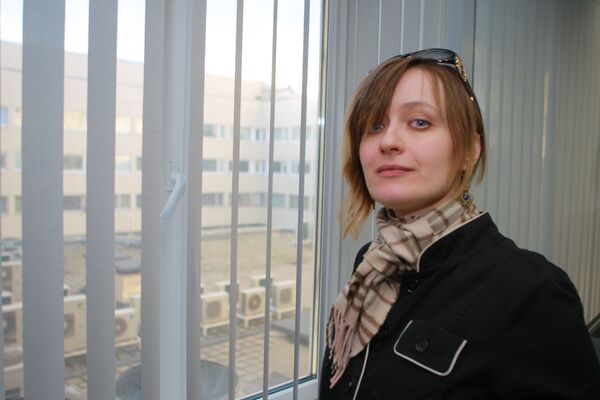When people ask me why I moved to Moscow, I usually reply “for the culture.” Jaded Muscovites may laugh at such earnestness, but then again, if you really are interested in modern Russian culture, Moscow is by far the best place to be. Still, the eternal debate between high art and low art that goes on around here means that some important cultural events don’t get nearly enough attention.
I am speaking, of course, of rock star Nikita Dzhigurda’s decision to film himself and a bunch of fans doing the Harlem Shake in downtown Moscow.
Now, if you’re a local journalist, you know that Dzhigurda is pretty much a goldmine as far as PR stunts are concerned.
Whether it’s beating up a religious radical on television (as I recall, Dzhigurda and the said radical got into an argument over which one of them appreciates the female form better), making a pass at art-house cinema while filming his wife give birth, or getting into a huge fight with someone in line at the notoriously slow Federal Migration Office, Dzhigurda delivers the goods.
I can never quite decide if Dzhigurda is more like Russia’s version of Dennis Rodman or Russia’s version of Axl Rose. He obviously looks like a pop culture icon of yesteryear – while actually being a modern phenomenon. His public persona would be sad, actually, if it weren’t for his manic energy and his desire to stay modern. Dzhigurda is unpredictable in ways that appear genuine, which is a far cry from most of Russia’s complacent, aging pop scene, where formaldehyde seems to have replaced hairspray a long, long time ago.
Dzhigurda is not young – but he’s impulsive and temperamental, like a toddler, and it works.
It was Dzhigurda, for example, who decided to post a weird video in support of the Pussy Riot punk rockers during their trial. Most major stars tried to stay far away from this politicized spectacle, but there he was, reciting his own poetry about how everyone must come to the courthouse, so that the “f*ckin court shuts up.”
And Dzhigurda was making his own YouTube version of “Gangnam Style” while his contemporaries are probably still trying to figure out how to use YouTube. It wasn’t quite as epic as the U.S. Naval Academy parody, but it was ridiculous enough to get a decent amount of hits in Russia. Now Dzhigurda has embraced the Harlem Shake phenomenon – and while the video from that was not great, it did result in some impressive scenes on Stary Arbat, including that bit when Dzhigurda lovingly embraced a policeman. If you know anything about the Moscow police, you can see the real entertainment value in such a stunt right away.
In the Age of Irony that we currently live in, sometimes it’s the most un-ironic performers that begin to stand out after a while. In Russia, this is of course tempered by the fact that pop culture is still being lorded over by cranky pensioners who support laws banning “gay propaganda” while simultaneously admiring the feather boas adorning lip-synching pop stars on TV.
But the future is coming, whether or not the cranky pensioners want it to or not – and guys like Dzhigurda get it. They understand that the dominance of state television will eventually wane somewhat – and YouTube will be the real frontier for pop stars very soon, if only because it allows for more spontaneity and improvisation.
Russian pop culture is used to following a certain script. Back in the Soviet era, it was all about either pleasing or outwitting the censors. Now we live in an era where everything is ruled by money as opposed to any particular ideology – it’s just that most of the money still comes from the government, and television executives in particular are always worried about inadvertently making some high-placed officials mad (in the absence of a set ideology, everything becomes unpredictable), hence the general blandness of their product.
Still, local culture is diversifying. “Life always finds a way,” Jeff Goldblum in “Jurassic Park” taught us that, and the same can be said about talent.
Dzhigurda’s talent, for example, lies in his ability to make awesomely bad videos – the kind of videos that transcend the very notion of “quality.” Love him or hate him, he does put his skills to good use.
Trendwatching in Russia is an extreme sport: if you’re not dodging champagne corks at weddings, you’re busy avoiding getting trampled by spike heels on public transportation. Thankfully, due to an amazing combination of masochism and bravado, I will do it for you while you read all about it from the safety of your living room.
Natalia Antonova is the acting editor-in-chief of The Moscow News. She also works as a playwright – her work has been featured at the Lyubimovka Festival in Moscow and Gogolfest in Kiev, Ukraine. She was born in Ukraine, but spent most of her life in the United States. She graduated from Duke University, where she majored in English and Slavic Literature. Before coming to Moscow, she worked in Dubai, UAE and Amman, Jordan. Her writing has been featured in The Guardian, Foreign Policy, Russia Profile, AlterNet, et al.
Trendwatcher: Of Blonds, Corruption and Poetry
Trendwatcher: the Mountain of the Dead Is Still Alive
Trendwatcher: Migrants in Moscow Break Jaws and Make Peace
Trendwatcher: Meanwhile in Russia, a Tank Crossed the Road
Trendwatcher: Acid Attack on Bolshoi Director Has Terrifying Implications
Trendwatcher: Irina Kabanova – No One to Turn To?
Trendwatcher: The Dima Yakovlev Law – A Crying Shame
Trendwatcher:Thinking Locally on Adoption
Trendwatcher: This American Pig
Trendwatcher: Desperately Seeking Pavel Kostomarov

